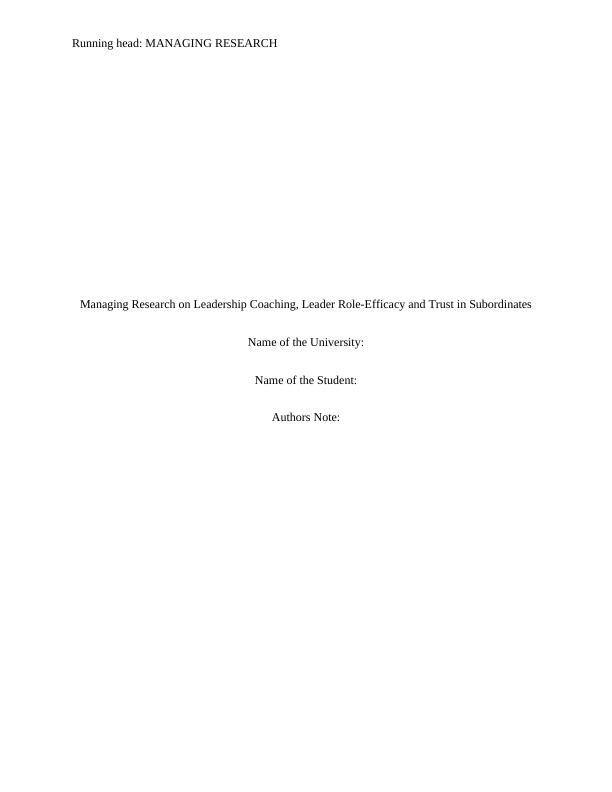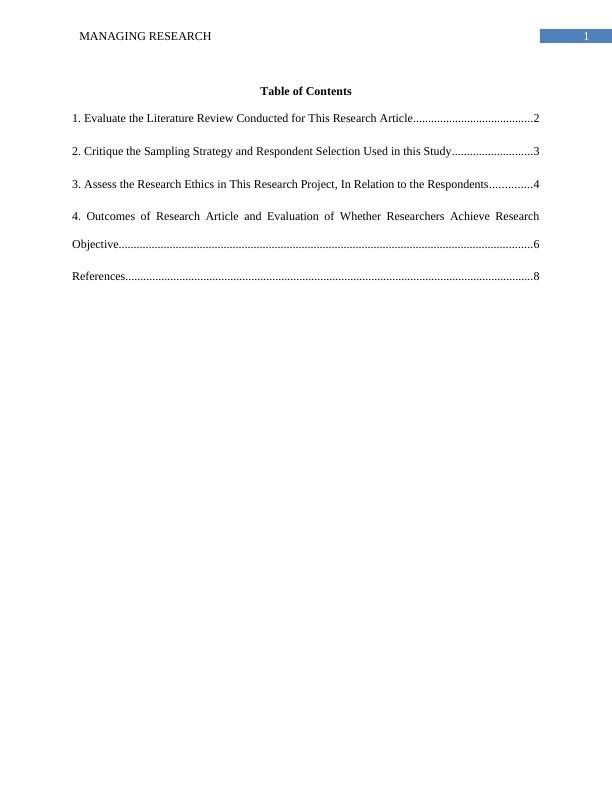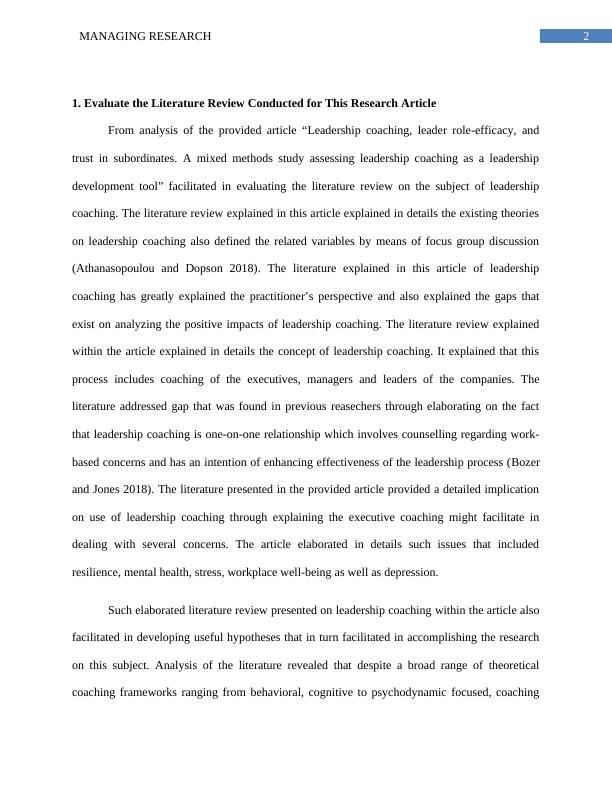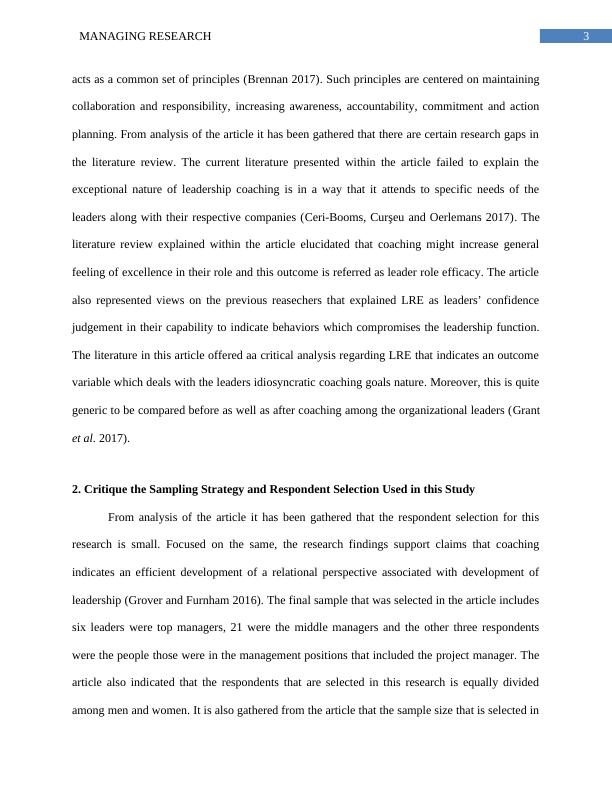Managing Research on Leadership Coaching, Leader Role-Efficacy and Trust in Subordinates
Added on 2023-06-11
11 Pages2689 Words333 Views
Running head: MANAGING RESEARCH
Managing Research on Leadership Coaching, Leader Role-Efficacy and Trust in Subordinates
Name of the University:
Name of the Student:
Authors Note:
Managing Research on Leadership Coaching, Leader Role-Efficacy and Trust in Subordinates
Name of the University:
Name of the Student:
Authors Note:

1MANAGING RESEARCH
Table of Contents
1. Evaluate the Literature Review Conducted for This Research Article........................................2
2. Critique the Sampling Strategy and Respondent Selection Used in this Study...........................3
3. Assess the Research Ethics in This Research Project, In Relation to the Respondents..............4
4. Outcomes of Research Article and Evaluation of Whether Researchers Achieve Research
Objective..........................................................................................................................................6
References........................................................................................................................................8
Table of Contents
1. Evaluate the Literature Review Conducted for This Research Article........................................2
2. Critique the Sampling Strategy and Respondent Selection Used in this Study...........................3
3. Assess the Research Ethics in This Research Project, In Relation to the Respondents..............4
4. Outcomes of Research Article and Evaluation of Whether Researchers Achieve Research
Objective..........................................................................................................................................6
References........................................................................................................................................8

2MANAGING RESEARCH
1. Evaluate the Literature Review Conducted for This Research Article
From analysis of the provided article “Leadership coaching, leader role-efficacy, and
trust in subordinates. A mixed methods study assessing leadership coaching as a leadership
development tool” facilitated in evaluating the literature review on the subject of leadership
coaching. The literature review explained in this article explained in details the existing theories
on leadership coaching also defined the related variables by means of focus group discussion
(Athanasopoulou and Dopson 2018). The literature explained in this article of leadership
coaching has greatly explained the practitioner’s perspective and also explained the gaps that
exist on analyzing the positive impacts of leadership coaching. The literature review explained
within the article explained in details the concept of leadership coaching. It explained that this
process includes coaching of the executives, managers and leaders of the companies. The
literature addressed gap that was found in previous reasechers through elaborating on the fact
that leadership coaching is one-on-one relationship which involves counselling regarding work-
based concerns and has an intention of enhancing effectiveness of the leadership process (Bozer
and Jones 2018). The literature presented in the provided article provided a detailed implication
on use of leadership coaching through explaining the executive coaching might facilitate in
dealing with several concerns. The article elaborated in details such issues that included
resilience, mental health, stress, workplace well-being as well as depression.
Such elaborated literature review presented on leadership coaching within the article also
facilitated in developing useful hypotheses that in turn facilitated in accomplishing the research
on this subject. Analysis of the literature revealed that despite a broad range of theoretical
coaching frameworks ranging from behavioral, cognitive to psychodynamic focused, coaching
1. Evaluate the Literature Review Conducted for This Research Article
From analysis of the provided article “Leadership coaching, leader role-efficacy, and
trust in subordinates. A mixed methods study assessing leadership coaching as a leadership
development tool” facilitated in evaluating the literature review on the subject of leadership
coaching. The literature review explained in this article explained in details the existing theories
on leadership coaching also defined the related variables by means of focus group discussion
(Athanasopoulou and Dopson 2018). The literature explained in this article of leadership
coaching has greatly explained the practitioner’s perspective and also explained the gaps that
exist on analyzing the positive impacts of leadership coaching. The literature review explained
within the article explained in details the concept of leadership coaching. It explained that this
process includes coaching of the executives, managers and leaders of the companies. The
literature addressed gap that was found in previous reasechers through elaborating on the fact
that leadership coaching is one-on-one relationship which involves counselling regarding work-
based concerns and has an intention of enhancing effectiveness of the leadership process (Bozer
and Jones 2018). The literature presented in the provided article provided a detailed implication
on use of leadership coaching through explaining the executive coaching might facilitate in
dealing with several concerns. The article elaborated in details such issues that included
resilience, mental health, stress, workplace well-being as well as depression.
Such elaborated literature review presented on leadership coaching within the article also
facilitated in developing useful hypotheses that in turn facilitated in accomplishing the research
on this subject. Analysis of the literature revealed that despite a broad range of theoretical
coaching frameworks ranging from behavioral, cognitive to psychodynamic focused, coaching

3MANAGING RESEARCH
acts as a common set of principles (Brennan 2017). Such principles are centered on maintaining
collaboration and responsibility, increasing awareness, accountability, commitment and action
planning. From analysis of the article it has been gathered that there are certain research gaps in
the literature review. The current literature presented within the article failed to explain the
exceptional nature of leadership coaching is in a way that it attends to specific needs of the
leaders along with their respective companies (Ceri-Booms, Curşeu and Oerlemans 2017). The
literature review explained within the article elucidated that coaching might increase general
feeling of excellence in their role and this outcome is referred as leader role efficacy. The article
also represented views on the previous reasechers that explained LRE as leaders’ confidence
judgement in their capability to indicate behaviors which compromises the leadership function.
The literature in this article offered aa critical analysis regarding LRE that indicates an outcome
variable which deals with the leaders idiosyncratic coaching goals nature. Moreover, this is quite
generic to be compared before as well as after coaching among the organizational leaders (Grant
et al. 2017).
2. Critique the Sampling Strategy and Respondent Selection Used in this Study
From analysis of the article it has been gathered that the respondent selection for this
research is small. Focused on the same, the research findings support claims that coaching
indicates an efficient development of a relational perspective associated with development of
leadership (Grover and Furnham 2016). The final sample that was selected in the article includes
six leaders were top managers, 21 were the middle managers and the other three respondents
were the people those were in the management positions that included the project manager. The
article also indicated that the respondents that are selected in this research is equally divided
among men and women. It is also gathered from the article that the sample size that is selected in
acts as a common set of principles (Brennan 2017). Such principles are centered on maintaining
collaboration and responsibility, increasing awareness, accountability, commitment and action
planning. From analysis of the article it has been gathered that there are certain research gaps in
the literature review. The current literature presented within the article failed to explain the
exceptional nature of leadership coaching is in a way that it attends to specific needs of the
leaders along with their respective companies (Ceri-Booms, Curşeu and Oerlemans 2017). The
literature review explained within the article elucidated that coaching might increase general
feeling of excellence in their role and this outcome is referred as leader role efficacy. The article
also represented views on the previous reasechers that explained LRE as leaders’ confidence
judgement in their capability to indicate behaviors which compromises the leadership function.
The literature in this article offered aa critical analysis regarding LRE that indicates an outcome
variable which deals with the leaders idiosyncratic coaching goals nature. Moreover, this is quite
generic to be compared before as well as after coaching among the organizational leaders (Grant
et al. 2017).
2. Critique the Sampling Strategy and Respondent Selection Used in this Study
From analysis of the article it has been gathered that the respondent selection for this
research is small. Focused on the same, the research findings support claims that coaching
indicates an efficient development of a relational perspective associated with development of
leadership (Grover and Furnham 2016). The final sample that was selected in the article includes
six leaders were top managers, 21 were the middle managers and the other three respondents
were the people those were in the management positions that included the project manager. The
article also indicated that the respondents that are selected in this research is equally divided
among men and women. It is also gathered from the article that the sample size that is selected in

End of preview
Want to access all the pages? Upload your documents or become a member.
Related Documents
Managing Research on Leadership Coachinglg...
|8
|1820
|374
Article Review on Leadership Coaching as Leadership Development Toollg...
|9
|2067
|399
Managing Research: Evaluation of Literature Review, Research Design, Methods, Sampling Strategy and Respondent Selectionlg...
|11
|2490
|491
Leadership Coaching as a Development Tool: A Mixed Method Studylg...
|8
|2051
|260
Leadership Coaching and Efficacy: A Mixed Method Studylg...
|9
|2132
|323
Managing Research: Evaluating Leadership Coaching and Its Impact on Leaders and Organizationslg...
|10
|2588
|143
